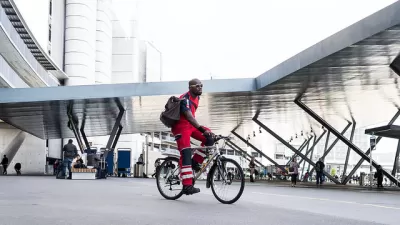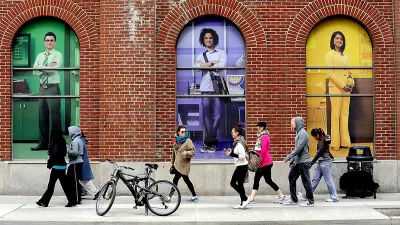Ninety percent of respondents to a recent survey overestimated the time it would take to walk or bike to work, and those with parking permits were the worst at guessing their commute times.

Pennsylvania State University conducted a study with 505 participants and asked them to estimate the time it would take them to walk or bike to work. 90 percent of respondents to a survey over-estimated how long it would take for them to walk or bike to work, according to an article by Gretchen Reynolds.
Drilling down into the data, the researchers found even more interesting insights. Those who did walk or bike were (not surprisingly) much more likely to guess accurately how long it would take them to walk, and those that had permitted work parking were most likely to overestimate the commute and to exaggerate that overestimation beyond their peers. Researchers suggest that if people knew how much time it actually took to get to work under their own power they might be more likely to opt to walk.
FULL STORY: Think Biking or Walking to Work Would Take Too Long? Think Again

Alabama: Trump Terminates Settlements for Black Communities Harmed By Raw Sewage
Trump deemed the landmark civil rights agreement “illegal DEI and environmental justice policy.”

Planetizen Federal Action Tracker
A weekly monitor of how Trump’s orders and actions are impacting planners and planning in America.

The 120 Year Old Tiny Home Villages That Sheltered San Francisco’s Earthquake Refugees
More than a century ago, San Francisco mobilized to house thousands of residents displaced by the 1906 earthquake. Could their strategy offer a model for the present?

In Both Crashes and Crime, Public Transportation is Far Safer than Driving
Contrary to popular assumptions, public transportation has far lower crash and crime rates than automobile travel. For safer communities, improve and encourage transit travel.

Report: Zoning Reforms Should Complement Nashville’s Ambitious Transit Plan
Without reform, restrictive zoning codes will limit the impact of the city’s planned transit expansion and could exclude some of the residents who depend on transit the most.

Judge Orders Release of Frozen IRA, IIJA Funding
The decision is a victory for environmental groups who charged that freezing funds for critical infrastructure and disaster response programs caused “real and irreparable harm” to communities.
Urban Design for Planners 1: Software Tools
This six-course series explores essential urban design concepts using open source software and equips planners with the tools they need to participate fully in the urban design process.
Planning for Universal Design
Learn the tools for implementing Universal Design in planning regulations.
Clanton & Associates, Inc.
Jessamine County Fiscal Court
Institute for Housing and Urban Development Studies (IHS)
City of Grandview
Harvard GSD Executive Education
Toledo-Lucas County Plan Commissions
Salt Lake City
NYU Wagner Graduate School of Public Service




























